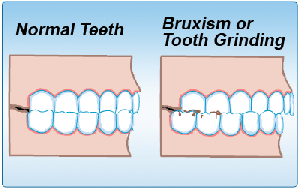Search for topics or resources
Enter your search below and hit enter or click the search icon.
March 1st, 2011 | 1 min read

 Do you grind your teeth? If you do, there are thirty million Americans like you who grind, or gnash their teeth on a nightly basis. This condition, known as Bruxism, subsequently leads to problems like sleep apnea. Grinding can also cause serious problems related to your neuromuscular systems, and affects not only your oral health, but your smile. Bruxism can result from many causes: a lack of symmetry of your teeth, anxiety, digestive issues, and patterns of disturbed sleep. Since the reflex for grinding is controlled by the brain, during sleep the reflex can actually result in an abnormal chewing action.
Do you grind your teeth? If you do, there are thirty million Americans like you who grind, or gnash their teeth on a nightly basis. This condition, known as Bruxism, subsequently leads to problems like sleep apnea. Grinding can also cause serious problems related to your neuromuscular systems, and affects not only your oral health, but your smile. Bruxism can result from many causes: a lack of symmetry of your teeth, anxiety, digestive issues, and patterns of disturbed sleep. Since the reflex for grinding is controlled by the brain, during sleep the reflex can actually result in an abnormal chewing action.
In particular, antidepressants known as selective serotonin reuptake inhibitors work by suppressing the brain chemical dopamine. This chemical controls muscular and motor activity, therefore, suppressing dopamine can bring on the tremors that are associated with Parkinson’s disease, not to mention a direct link to gnashing of the teeth. This, in turn, causes headaches, and the eventual wearing down of your teeth.
The wearing down of your teeth as a result of Bruxism can be exacerbated by everyday products and medications we use. Especially in the US, there are products containing dangerous acids that not only reduce the flow of saliva in your mouth, but make your teeth more susceptible to tooth decay. Common products such as soft drinks, sports drinks, herbal teas, sports drinks and aspirin wear down the enamel on our teeth due to high acidity. This leaves them brittle, and when further combined by gnashing of teeth from bruxism, it can be doubly destructive.
There are some effective home remedies that can help prevent bruxism: You can also try to relax your jaw muscles by using a warm washcloth around the sides of your face. This relaxes the clenched muscles that cause head pain. Since stress is one of the catalysts for grinding, you can also try massaging your neck muscles, face and shoulders. Taking a warm bath before bed is not a bad idea, either. If there is no time for these preventatives, you can try sleeping on your back. This is the best, least-stressful position for restful sleep.
As always, please visit your dentist; they can help you with your clenched jaws and grinding, as well as with other issues. Specifically, look for a dentist who is trained in neuromuscular dentistry, who can help you adjust your bite to prevent the damage resulting from Bruxism.
Topics: